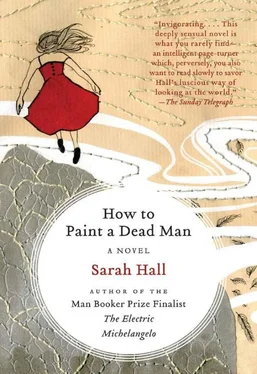Sarah Hall - How to Paint a Dead Man
Здесь есть возможность читать онлайн «Sarah Hall - How to Paint a Dead Man» весь текст электронной книги совершенно бесплатно (целиком полную версию без сокращений). В некоторых случаях можно слушать аудио, скачать через торрент в формате fb2 и присутствует краткое содержание. Год выпуска: 2009, Издательство: Harper Perennial, Жанр: Современная проза, на английском языке. Описание произведения, (предисловие) а так же отзывы посетителей доступны на портале библиотеки ЛибКат.
- Название:How to Paint a Dead Man
- Автор:
- Издательство:Harper Perennial
- Жанр:
- Год:2009
- ISBN:нет данных
- Рейтинг книги:4 / 5. Голосов: 1
-
Избранное:Добавить в избранное
- Отзывы:
-
Ваша оценка:
- 80
- 1
- 2
- 3
- 4
- 5
How to Paint a Dead Man: краткое содержание, описание и аннотация
Предлагаем к чтению аннотацию, описание, краткое содержание или предисловие (зависит от того, что написал сам автор книги «How to Paint a Dead Man»). Если вы не нашли необходимую информацию о книге — напишите в комментариях, мы постараемся отыскать её.
, Sarah Hall, "one of the most significant and exciting of Britain's young novelists" (
), delivers "a maddeningly enticing read... an amazing feat of literary engineering" (
).
How to Paint a Dead Man — читать онлайн бесплатно полную книгу (весь текст) целиком
Ниже представлен текст книги, разбитый по страницам. Система сохранения места последней прочитанной страницы, позволяет с удобством читать онлайн бесплатно книгу «How to Paint a Dead Man», без необходимости каждый раз заново искать на чём Вы остановились. Поставьте закладку, и сможете в любой момент перейти на страницу, на которой закончили чтение.
Интервал:
Закладка:
I am not lonely, but receiving such a letter reminds me of the other souls in this world whom I might have liked to meet.
The Fool on the Hill
Peter’s first rule of practice is that a canvas should fit into the boot of a car. It’s a simple rule: size dictates size. A commonsense policy, the best kind. He’s been telling his daughter for years she should adopt such measures in her work, and in her life also, but she won’t listen. ‘Dad,’ she says, ‘you should expand your mind. You don’t have to think small any more.’ No, no. Children are not interested in the wisdom of fathers. He can hear her creaking around in her room now, treading the oak boards, hauling up the sash window to let the dewy, laundered air in; dragging her enormous portfolio around. Always an early riser, Suzie, like her mother. And always contrary. A mystery where that particular attitude comes from.
He on the other hand is not what we might call lark-like. At least not today, on this late-summer morning with its light like ageing copper, and its insistence on no more than his being in the world. The breeze is thick and green in the trees outside the window. He casts a long leg outside the quilt to cool off-hot under the covers now the sun is beginning to magnify through the glass pane. He should get up. He should get up, have a cup of coffee, a glass of water and a rolly; get going for the day. He should swing into action, yes indeed. And if he were a man of greater resolve, if he were a man of veritable habit, perhaps he would do that. But it’s tough, this whole business of entering the world. Pondering the opposing poles of rules and daughters is enough to be going on with just now, never mind tackling burnt toast scrapings in the sink, hardboard emulsion, and all else the risen must contend with.
With a bit of luck Lydia might fetch him up a brew and deposit it on the bedside table. With a bit more luck she might be inveigled back under the covers and they can put the morning glory to use. Unlikely. She knows better than to enable his inertia. Better to tempt him out of his comfortable pit with the grinding of coffee beans, the black aroma wafting through the kitchen and up the stairs, and with the frazzling of wheat crumbs under the grill. Better to torture a fellow with unavailable pleasure; she’s got that one right, his wife. Just another five minutes or so, maybe then he’ll be fit for employment; then he’ll spring up, ‘ta-da’, and surprise them all.
He tucks the leg back under the quilt, folds the cover down off his chest to cool his upper body. Nope. Children never listen to the rules of their parents. It’s like advising a horse to saddle itself. Nor did he give much credence to the laws and logistics of his old man. Neville Caldicutt had routines they could set the Metro clock by. Off to Shildon club on Wednesdays and Saturdays, partaking of not more than three pints of stout and a finger of Grouse for the road. Bed at a good hour on weekdays so as to be up at five the next morning to catch the colliery bus. Fish on Friday when the pay came in, no matter the catch, no matter the monger’s chalkboard list and the bad bloody north-east tides. NCB coat to be worn winter and summer, bonfire night, and election day. Union votes. Coronation mugs for visitors. And a halfpenny tossed off the bridge into the river after church, as alms for the Lord. Because Neville Caldicutt would not put anything into the cloth collection purse passed up and down the aisles; he was averse to new vicarage roofs, but was a God-fearing man nonetheless, and the river seemed as likely a channel to charity as any. ‘Heads for the Holy Ghost, tails for the fishes,’ he would say to them as he spun the coin off his thumbnail into the cleggy water. That was a genuine bit of daftness, Peter always thought. That was enough for two liquorice laces, one for him and one for his sister Hillary. Or maybe it was the price to pay for not being sent to Sunday school.
His father used to bring him a cup of tea and a biscuit in those unoccupied, dogwatch hours, before he went off to the mine. It was the pitching of the mattress that always woke Peter, not the chirping of the outhouse door or the shuffling of the tartan slippers on the stairs. Neville Caldicutt would leave the light off, and would sit on the wire-sprung bed, and talk softly about this, that and the other to his son. He would talk about working men’s politics, right and wrong, about school, and his great hero Bevan, and places to which he had never been but had always hoped to go. South America. Australia. Brighton pier. ‘That’ll be me then, lad,’ he would say a few minutes later as they heard the old grumbler stalling on the corner of Alnwick Street and the doors on the terrace shutting, one by one. And the bedsprings would squeak and rattle as his father stood up to leave.
Peter would switch on the light for a few minutes, drink maybe half the cup of tea, to the third blue line painted round its inside. He’d nibble the digestive, then sleep again until his mother screeching the curtain rings woke him two hours later. ‘Time to get up, Petie. Shake a leg.’
His father sitting in the dark: that’s what he remembers. Those gloomy, unseen movements. That pipey underground voice, preparing for the day with inconsequential murmurs. And the malty crunch from a biscuit packet, and those cold-stove winter mornings, when men in the street rose before the birds’ chorus and Peter waited for the next blue ring of daylight before getting up.
He’s told the kids all this. He likes to talk about it when he’s got them all home at the cottage and the fire is crackling and the homebrew is doing the rounds. It’s good to recall the past and family. Good to know where you come from. Danny thinks it’s hilarious-biscuits at the crack of dawn. Danny boy: never up until midday, then usually hung-over or coming down, and presently kipping, for some reason, in a jerry-rigged berth under the cottage stairs. But always amused by his dad when cogent, always willing to play a hand of nostalgia poker. Danny Dando, Two of Two. ‘Was there an outside lavvy?’ he asks. ‘And bits of the Sun to wipe your bum on?’ ‘Yeah, kiddo, there was-not even Bronco.’
Susan smiles like the Sphinx during his chatter and busies herself with other things. Flicking through a book. Keeping the coal turned towards its orange industry in the grate. She looks away from the stories he tells, towards the embers, or towards the pages. Suzie-Sue. One of Two. She with her impatience and that daughterly tendency to spat with her old man. She with her fine eye and those gigantic sheets she likes, that cost a bomb to print and frame and have got her into Goldsmiths College. Here she is next door, creaking the floorboards, not lying in. Just finished her foundation year and straddled between home and a brassy move to the capital. She doesn’t believe in his car-boot rule, never has, never will. ‘What would Kokoschka have done with that kind of attitude?’ she asks him, her brow pinched. Yeah, children always see the limitations of their parents. She’ll find her own way, no doubt about that, he thinks, whenever her face disappears from him, whenever she turns a log in the grate holding the corner with her bare hand. ‘Something wrong with the tongs, love?’ He can’t help asking, pedantic old bugger that he is.
Peter stacks all the pillows behind him and sinks his head back into the cotton swale. He switches the radio on. On the morning programme, a plum-tongued Tory is smarming about kids overdosing at warehouse parties, so he switches it off again. Could do with a piss — it feels like his bladder’s begun shrinking at night. Time to think about getting up, seriously. Time to get organised and think about the doings and happenings of today. One — go for a run and clear the cobwebs. Two — bastard accounts. Three — ring Abbotsford and bollock them about printing the wrong dates for his talk (always getting the simplest things wrong!). Then do some clearing up in the studio maybe, though that would take a kind of mental fortitude probably not available today. No, he should make the most of this gorgeous fading season, get out and do something useful. He should use the light. He should go to the ravine with his gear and make some more studies. Remembering first to put some petrol in the car. And to look at the exhaust to see if it’s coming unmoored from the chassis, as the recent grunting sounds would imply. He’s loath to admit defeat just yet and condemn it to the great scrapyard in the sky.
Читать дальшеИнтервал:
Закладка:
Похожие книги на «How to Paint a Dead Man»
Представляем Вашему вниманию похожие книги на «How to Paint a Dead Man» списком для выбора. Мы отобрали схожую по названию и смыслу литературу в надежде предоставить читателям больше вариантов отыскать новые, интересные, ещё непрочитанные произведения.
Обсуждение, отзывы о книге «How to Paint a Dead Man» и просто собственные мнения читателей. Оставьте ваши комментарии, напишите, что Вы думаете о произведении, его смысле или главных героях. Укажите что конкретно понравилось, а что нет, и почему Вы так считаете.












